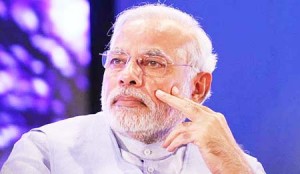Khaleej Times
Aditya Sinha
On Tuesday, journalists in New Delhi marched in protest against the beating up of ten young journalists, from both print and TV channels, by lawyers who were supporters of the ruling Bharatiya Janata Party (BJP). It is still not clear if they are actually lawyers. They were led by local legislator, O.P. Sharma, who is also a former personal assistant to Finance Minister Arun Jaitley – who, incidentally, was in court that day for a defamation case he is pursuing against Delhi Chief Minister Arvind Kejriwal.
These lawyers had assembled at Delhi’s Patiala House lower courts to beat up teachers and students of the traditionally left-leaning Jawaharlal Nehru University (JNU), an institution that has produced more social science scholars who are academically of global repute than any other in India. The JNU crowd was at court because their students’ union president, Kanhaiya Kumar, is charged with sedition. Don’t be fooled by the charge. It’s clear he is no anti-national. Yet as usual, the government and its gang relentlessly label anyone who is anti-government as anti-national.
For instance, in January, a dalit PhD student of Hyderabad Central University (HCU), Rohith Vemula committed suicide. He had been actively hounded by the BJP’s student wing – the Akhil Bharatiya Vidyarthi Parishad (ABVP), which also instigated last week’s clashes at JNU with the leftist students during a peaceful rally, that led to police action and sedition charges – as well as by the University administration. Rohith was ejected of his hostel, deprived of his scholarship funds (which also sustained his impoverished family), and finally took his own life, leaving behind an eloquent note that moved the country (as well as other campuses). The BJP’s only response has been to monolithically deny that Rohith was a dalit.
Rohith was called anti-national because he had protested the 2013 hanging of Mohammed Afzal Guru, a Kashmiri who was convicted of conspiracy in the 2001 Parliament attack case. The execution was seen by many, especially Kashmiris, as wrong and vindictive; hence the continuing protests. Even I was against the hanging because I’m against the death penalty (practically not a deterrent, philosophically irreconcilable with libertarianism); but I can hardly be called anti-national. Rohith’s death brought the issue to other campuses – something that cannot help the BJP, considering part of Modi’s vote-tally during his spectacular 2014 win came from first-timers, who are predominantly students – including to JNU.
Last week’s dispute on campus over a protest rally should have been handled by the university authorities. Yet an outside agency, the police, was summoned. This is not surprising since less than three weeks earlier, JNU got a new vice-chancellor (VC): M Jagadeesh Kumar, a former professor of electrical engineering at the Indian Institute of Technology, but more importantly a regular at Vijnana Bharati, a science affiliate of the Rashtriya Swayamsewak Sangh (RSS), which is the BJP’s parent body. The new Modi government-appointed VC immediately got down to what the RSS has long demanded: a “clean-up” of JNU. Kanhaiya after his arrest was to be produced in court on Tuesday. On Monday, some lawyers sympathetic to the BJP circulated a WhatsApp message, calling upon peers to “teach a lesson” to anti-nationals. So the next day, while all were in the courtroom awaiting the judge, a gang of robed men entered and severely thrashed several JNU teachers and students. The lawyers then turned on the journalists who were witness to the violence, labelling them “anti-national” as well.
It was shocking but not surprising. Modi and his ministers have repeatedly targeted the media as “news traders” and “presstitutes”. The BJP’s parent and ancillary outfits regularly resort to street violence and Modi maintains silence each time, signalling to his supporters acquiescence, if not endorsement, of the violence. Nobody expects that those who assaulted journalists on Tuesday will face legal consequences. Such is the current milieu.
Why is this “cultural war” taking place now? Modi’s election plank was explicitly and exclusively good governance and development, but it his government’s management of the economy that has been a disappointment. Inflation is a factor in every state election; the Sensex is down to pre-Modi levels; and the national budget that is due on February 29 is expected to be lacklustre, given the constraints of a global economic tailspin and domestic compulsions like revenue shortfall and payouts to military pensioners. In short, violence is a distraction from bad times. Journalists have not been under attack like this since the time of the Gandhis. Indira Gandhi proclaimed an Emergency in 1975-77, and targeted senior journalists; Rajiv Gandhi introduced a draconian Anti-Defamation Bill in 1988 but had to withdraw when journalists – myself included – rallied in numbers in New Delhi (much like Tuesday’s march). Modi, who always polemically attacks the Nehru-Gandhi dynasty, shares more of their characteristics than he probably realises. What he seems to forget is that both those prime ministers fell from power after their assaults on the fourth pillar of democracy, the media. Unless, of course, in the three-plus years that he has left, he destroys the other pillars as well.




